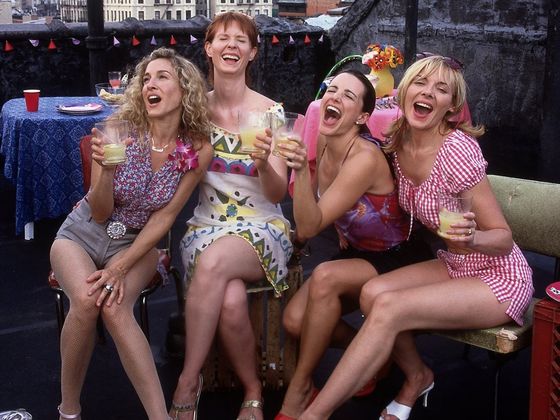Like Carrie
Courtesy of E! Entertainment
I have thick, curly, blonde hair—and I’ve struggled with it my whole life.
Everyone at my Catholic middle school seemed to have straight, easy, silky hair. It bothered me. Fervently brushing my hair every morning became a misguided coping mechanism, and I unwittingly turned it into more of a puffy mess than it would have been otherwise. I would have given anything to change it. And I tried. Two Brazilian hair straightening experiments left me with only a powerful sting in my eyes that lasted several hours, and then the usual frizz a day later.
It was not until I started seriously watching Sex and the City (SATC) my freshman year of college that I began to make peace with my hair.
The show’s protagonist, Carrie Bradshaw, is a single, 30-something, New York City relationship columnist. And once Carrie became a regular fixture in my life, I claimed her in earnest—she was the monolithic, curly-haired role model I’d been missing all my life. She was smart, sexy, witty, and had hair just like mine. She represented exactly what I wanted the world to see in me, but that I had trouble expressing myself. Standing in opposition to the otherness I felt in childhood, Carrie looked and acted like the ideal, fully realized version of myself. Though it began with her hair as the superficial connection, she grew to mean so much more to me.
I quickly fell into a rabbit hole of everything “Carrie.” I bought a gold nameplate necklace like hers, spent hours scouring the internet for a poster of her bus advertisement from the credit sequence (it doesn’t exist), started writing about my romantic endeavors like Carrie, and mentally referred to my boyfriend as “Big.”
Another reason I clung so tightly to Carrie was because I was having casual sex for the first time in my life. In many ways, the beginning of college meant the beginning of my sexual journey, and SATC became a guidebook for navigating that: a stand in for my mother, an older sister, a best friend. Having been brought up in an environment that didn’t want to accept, let alone explore, female sexuality, I turned to the show to validate my own experiences. I began to feel as if the show was almost spurring me on, pushing me to pursue that journey, with the mantra “Do It for Carrie” in the back of my mind. I, still, can’t decide if that’s healthy or not.
And yet, as my obsession with Sex and the City raged on, I also had to acknowledge the bitter taste in my mouth the show oftentimes left me with. Many of the lines really don’t age well. The characters are sometimes homophobic, sometimes racist, and often flat-out cringey. They are all impossibly skinny, wealthy, and white. The blatant and unapologetic lack of diversity doesn’t sit well in 2018.
Additionally, the show’s feminism almost never aligns with mine. Samantha sees a woman’s only power as sex, Miranda sees no room for femininity in the workplace, Charlotte’s puritan values overshadow empowerment, and Carrie will never be truly happy without a man.
I started to fight my connection to SATC. I was afraid I might be patterning my life after Carrie’s on a not-so subliminal level. I will most likely move to New York after college, apply for jobs at magazines, and try to date a lot of men. Would I have come up with that life plan without Carrie Bradshaw?
I justify all of this to myself by realizing that, for me, SATC somehow manages to rise above its problematic messages and one-liners. The fact that different types of feminism were being shown means more than the perfectness of that feminism. Their unabashed showcasing of female sexuality was bold and complex. These women were flawed, complicated, and hypocritical. And they reflect the flawed, complicated, and hypocritical women who watch their show. In a media landscape that is still (20 years after the release of SATC) rife with sexist, one-dimensional caricatures of women, I believe there is a lot to be said for the representation of these four ladies.
At the start of my odyssey towards adulthood, Sex and the City, in all its imperfection, was an essential tool for me to lean on. As I continue to grow up and “find myself” in college and beyond, I’m glad that I had Miranda, Samantha, Charlotte, and Carrie to back me up.
And if nothing else, Carrie taught me that my hair doesn’t make me an outcast, but that in fact, it just might make me cool. – JR Atkinson
JR Atkinson is a freshman at Wesleyan University, from Chicago, IL. She is planning on majoring in English and Film.

